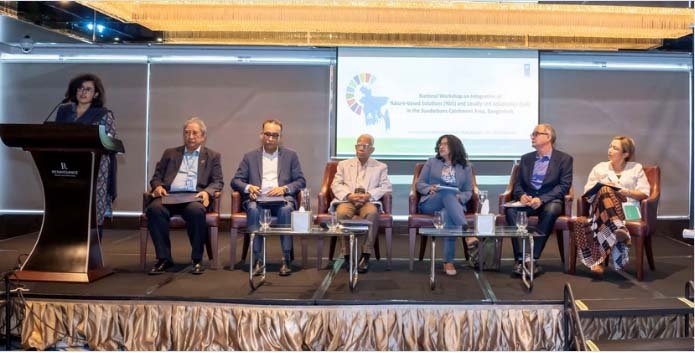Dhaka office: Experts at a workshop stressed the crucial role of the Sundarbans in Nature-Based Solutions, calling for a collaborative effort from all stakeholders to address issues related to this magnificent ecosystem and its surrounding communities.
The United Nations Development Programme (UNDP) organised the national workshop in Dhaka on Saturday (25 Nov), focused on the integration of Nature-Based Solutions (NbS) and Locally Led Adaptation (LLA), in the Sundarbans, the world’s largest mangrove forest.
The primary objective of the workshop was to engage and consult with stakeholders to identify issues, prioritise interventions, and understand challenges and opportunities in the Sundarbans catchment area. Participants delved into the intricacies of combining LLA and NbS, with a specific focus on addressing pressing regional development needs.
Iqbal Abdullah Harun, Additional Secretary, Ministry of Environment, Forest and Climate Change, attended the workshop as the Chief Guest, the event also gathered experts, including Mohammed Asaduzzaman, Former Research Director and Professorial Fellow, BIDS; Stefan Alfred Groenewold, Principal Advisor, GIZ; Nayoka Martinez-Bäckström, First Secretary and Deputy Head of Development Cooperation, Embassy of Sweden in Dhaka; and Sonali Dayaratne, Deputy Resident Representative, UNDP Bangladesh.
Iqbal Abdullah Harun in his speech laid importance on the vital role of the Sundarbans and called for a collaborative effort from to address issues related to this ecosystem and its surrounding communities.
He also highlighted the need to modify policies to support nature’s inherent ability to thrive.
Taking part in the discussion, experts stressed the significance of biodiversity and discussed how new initiatives can learn from previous projects in the area.
The importance of a coordinated effort involving government bodies, development partners, civil society organisations, non-governmental organisations, researchers, and communities was underscored. They also highlighted the importance of planning, large-scale design, and financing as central to addressing the challenges of the Sundarbans region.
Through a series of presentations, exercises, and open discussions, workshop participants explored the potential of integrating NbS and LLA. Dr. Haseeb Md. Irfanullah, National Consultant, UNDP, moderated the workshop, ensuring a constructive and insightful dialogue.
During the workshop UNDP’s commitment was reaffirmed to enhancing the Sundarbans and its neighbouring areas – a vital sanctuary for biodiversity, a natural shield against extreme climatic events, and a lifeline for millions.
The collaborative spirit was palpable as participants shared enthusiasm, experience, and hope for area-specific programming driving sustainable growth for the region.
This collaboration will strengthen the partnerships for the sustainable future of the Sundarbans and its communities. The outcomes of this workshop will contribute to shaping policies and initiatives that ensure the resilience and well-being of this ecologically significant region.

